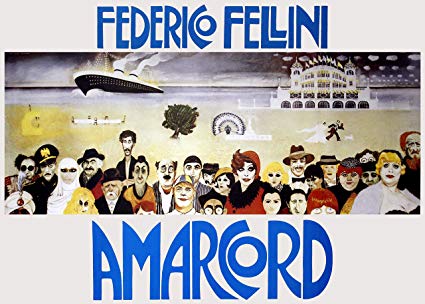A few volunteers from Team Experience are revisiting Federico Fellini classics for his centennial. Here's Eric Blume...

Federico Fellini’s 1975 film Amarcord is considered the culmination of his style and artistry, the “most Fellini” of Fellini films, the one that won him his last (of four) Best Foreign Film Oscar, as well as prizes from the New York Film Critics and National Board of Review as director of the year. And he never made a film afterwards that rivaled its success or connection with audiences...
 Fellini on setAmarcord remains a film both simple and complex. It has no plot, and rather covers vignette stories of inhabitants of a small seaside town near Rimini (a riff on Fellini’s hometown), only some of which involve a young Fellini character, over the course of one year, from one arriving spring to another.
Fellini on setAmarcord remains a film both simple and complex. It has no plot, and rather covers vignette stories of inhabitants of a small seaside town near Rimini (a riff on Fellini’s hometown), only some of which involve a young Fellini character, over the course of one year, from one arriving spring to another.
But the world Fellini creates here has a deep artistry to it. It’s not a recreation of stories from his youth, or even really a remembrance of it. Fellini conceives the movie visually and tonally with a compelling combination of poetry and vulgarity. It is both low and high art: for every moment of his gross uncle’s incessant farting, there’s an image of a stylized ocean liner appearing to the villagers in the darkest of nighttime seas.
Fellini’s characters are loud, infantile, passionate, and messy. The movie is staunchly and intensely Italian, and Fellini takes great care to both celebrate and indict his culture. He looks the hypocrisy of the church straight in the eye, and gives us an early version of JoJo Rabbit in a long sequence on Facsism. Fellini pokes good-humoredly but firmly about his fellow Italians’ simultaneous blind faith in some rules and complete disregard for others. The more time you’ve spent in Italy, the deeper you can appreciate and understand this movie, as a lot of it is very culturally specific.
When I hear a movie being referred to as a “kaleidoscope” I usually want to run to the nearest exit, but Amarcord TRULY is a kaleidoscope of a movie. Fellini takes moments probably honest from his childhood, but he gives them an artist’s re-interpretation. All of the sequences are heightened, but by pitching his world through this prism of revision, he captures the essence of his childhood, and of the people and his town, with more depth and feeling than if he had done more “accurate” recreations. His vision on this picture is unique and stunningly realized.

Fellini’s obsession with boobs and asses is in full force. The local boys follow the idealized town beauty Gradisca like dogs, and the camera follows her tightly-costumed wiggle, but Gradisca has a radiance and heart that’s quite moving. And the famous scene where young Fellini finds himself in the overwhelming bosom of the tobacco store owner manages to be uncomfortable, funny, sensual, and bizarre all in equal measure. In some ways, the gorgeous moment in Pain and Glory, when Young Salvador faints from the sheer beauty of seeing his first naked man, feels like an evocation from Fellini. Artists who can address the awakening and staggering power of their sexuality with this much candor and humanity don’t come around every day.
But the real reason Amarcord still pulses today is the pure lyricism of Fellini’s images, and the way he moves people through time and space within the frame. That ocean liner, a peacock, snow piled together in a packed maze: there’s dozens of memorable images that seem to exist both realistically and poetically together. And Fellini uses the nightly Italian passeggiata to both create authenticity and also to create stylization. There’s one sequence in the film where he moves the townspeople in artfully staged, non-realistic movements and patterns across the village piazza that’s enough to make your heart burst from the sheer audacity and inventiveness of it.
Amarcord suffers from the awful post-synchronized sound that mark so many of the Italian classics, and there are probably a few too many vignettes here, but it’s a special movie that survives as a glorious testament to Fellini’s singular talent.

Previous Fellini pieces...
Fellini's Casanova (1976)
Roma (1972)
8½ (1963)
La Strada (1954)